2013版初中英语全程复习方略课件(教材复习案)七年级下册 Modules 1-4(外研版)(共44张PPT)
文档属性
| 名称 | 2013版初中英语全程复习方略课件(教材复习案)七年级下册 Modules 1-4(外研版)(共44张PPT) | 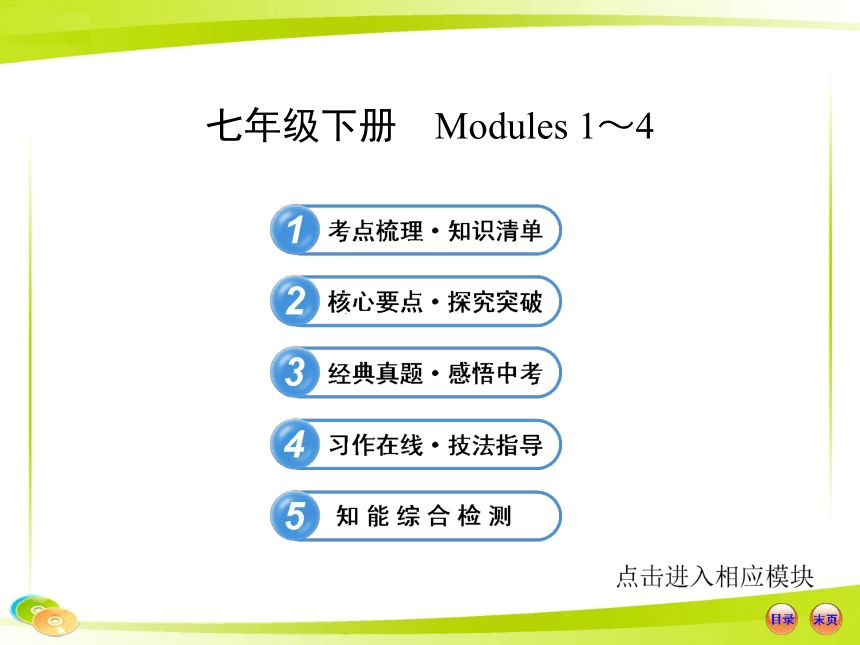 | |
| 格式 | zip | ||
| 文件大小 | 1.8MB | ||
| 资源类型 | 教案 | ||
| 版本资源 | 外研版 | ||
| 科目 | 英语 | ||
| 更新时间 | 2014-03-01 17:49:19 | ||
图片预览

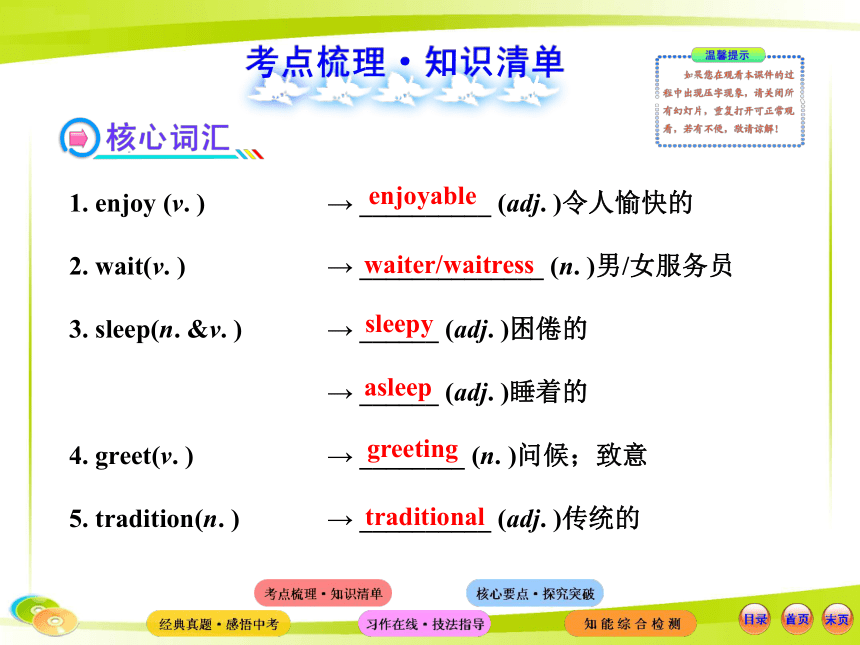

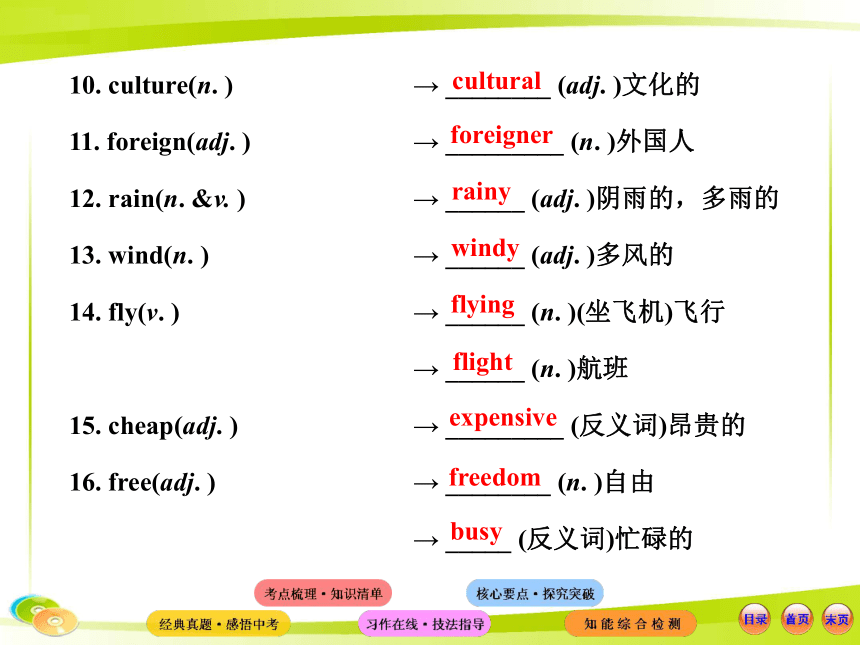
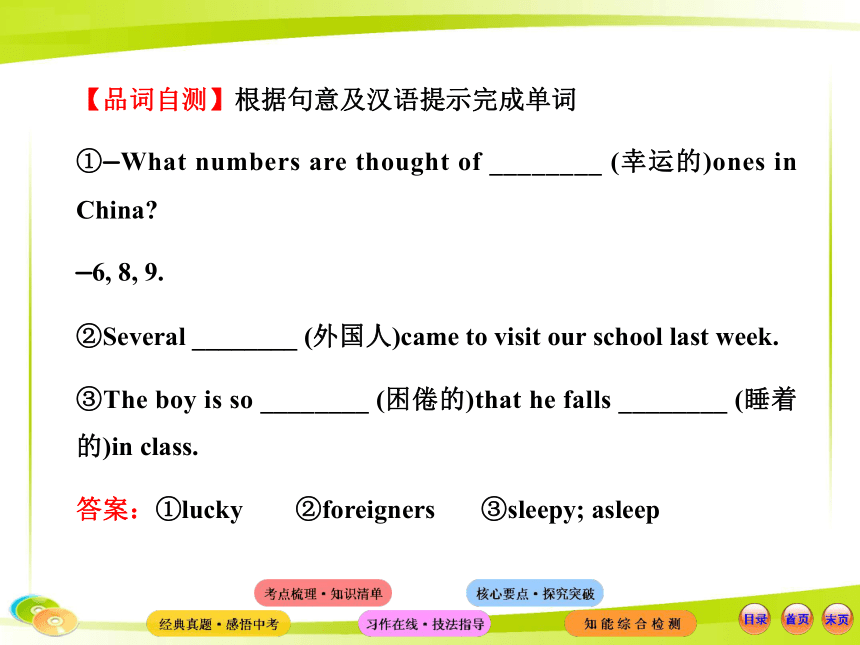
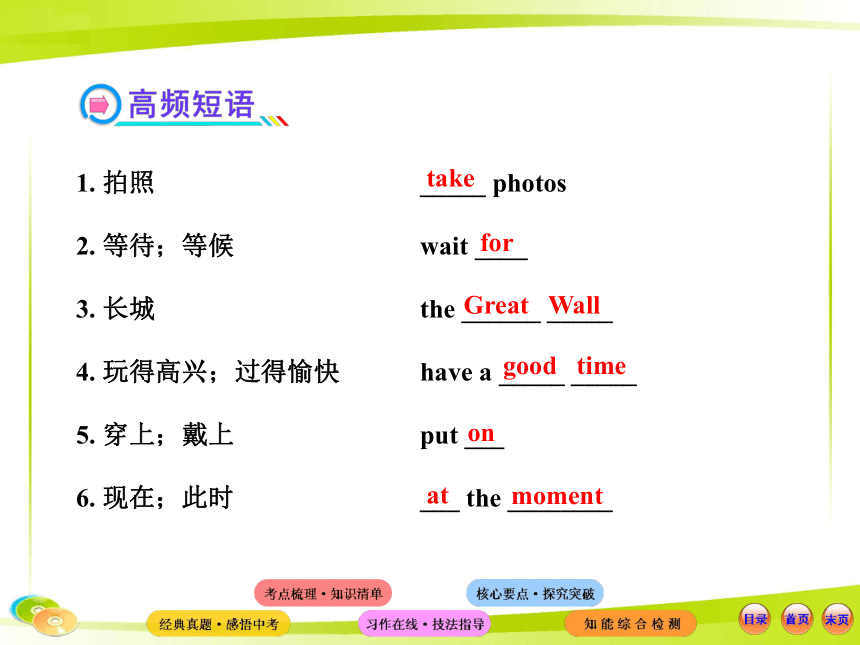
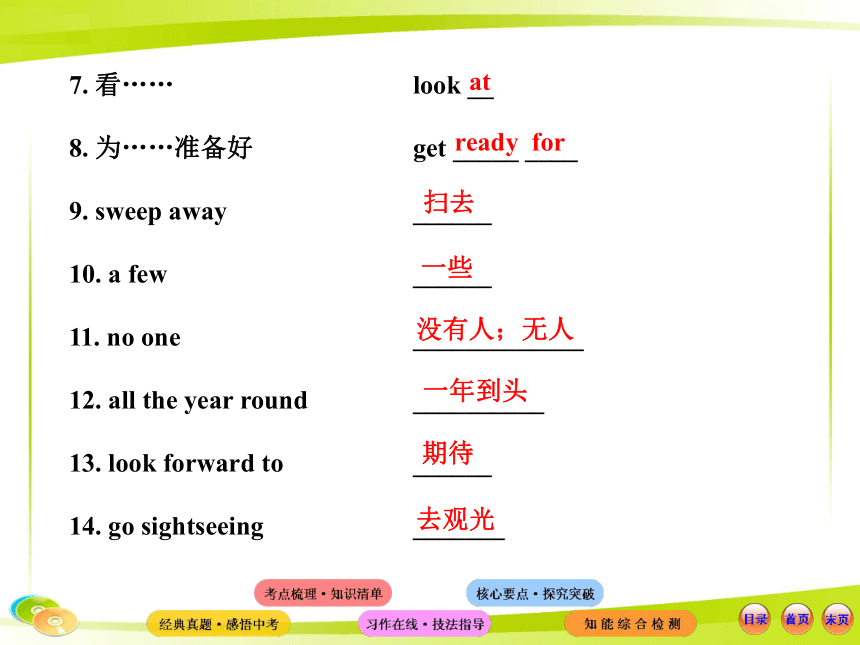
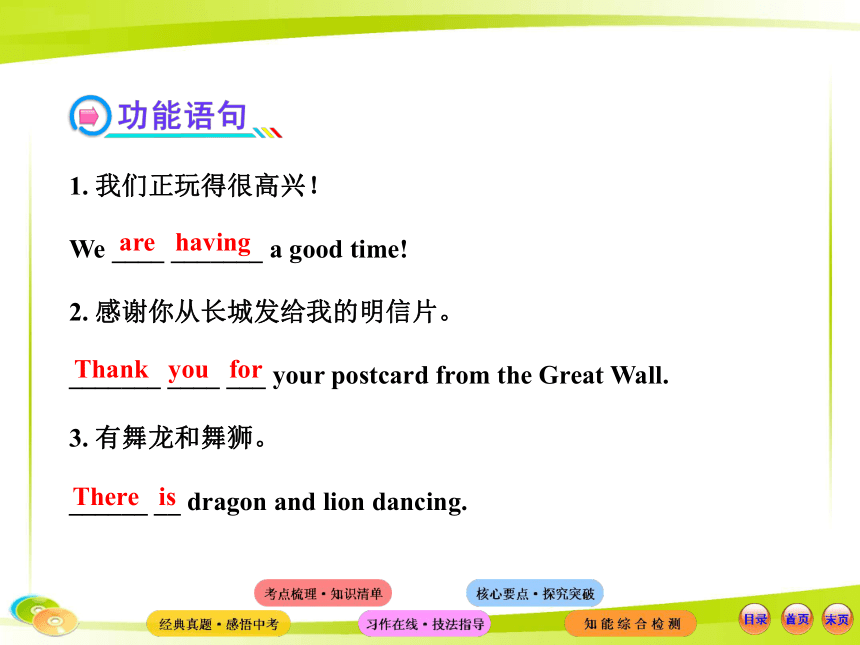
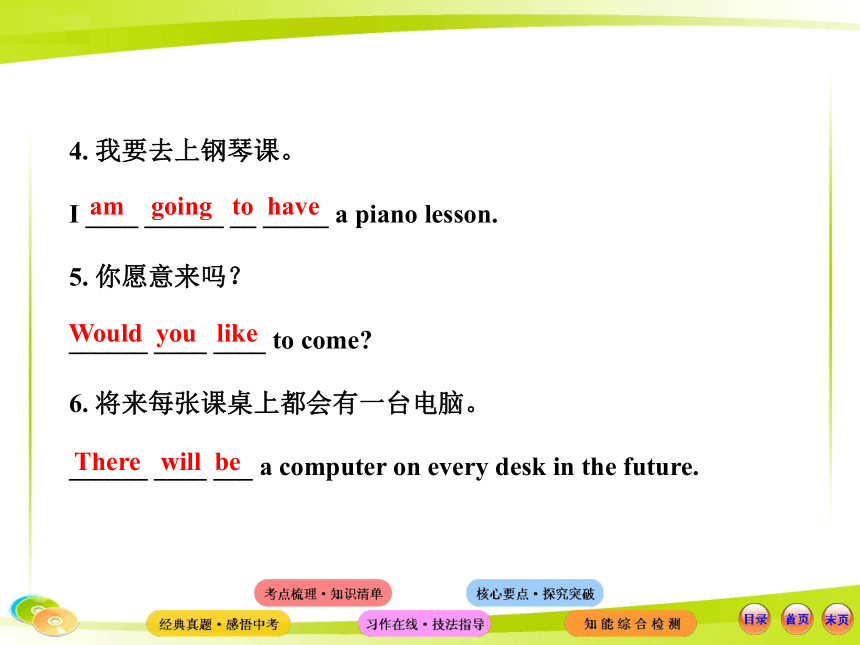
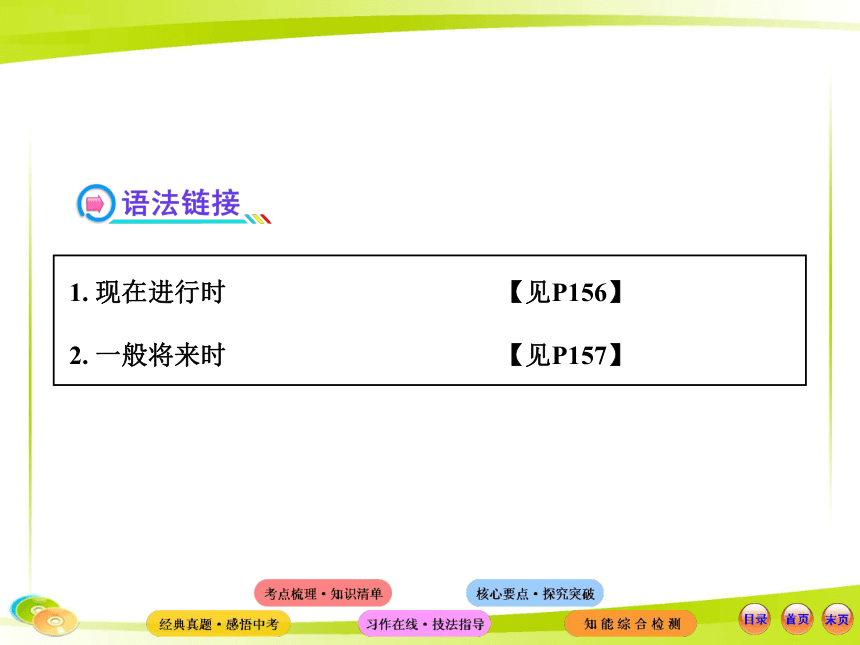
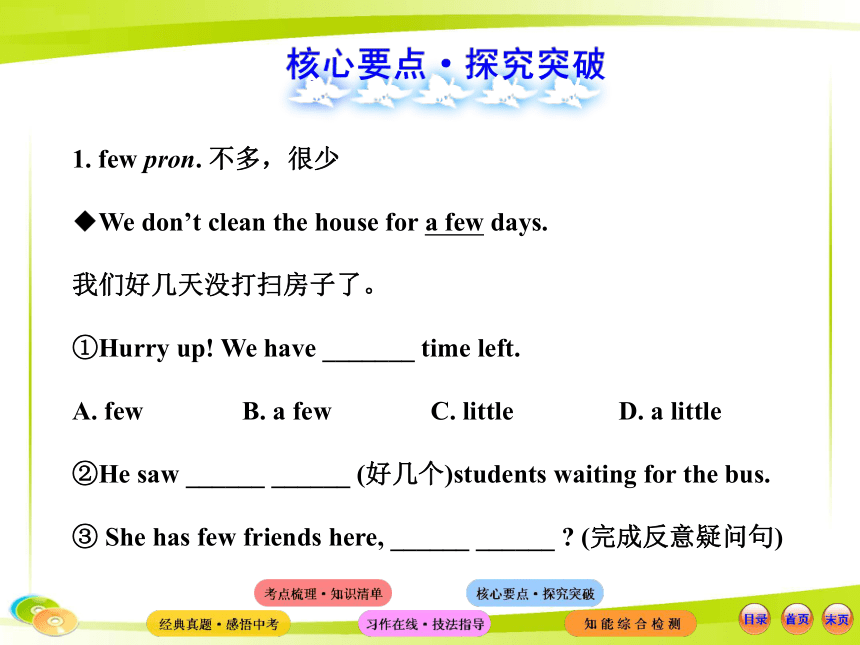
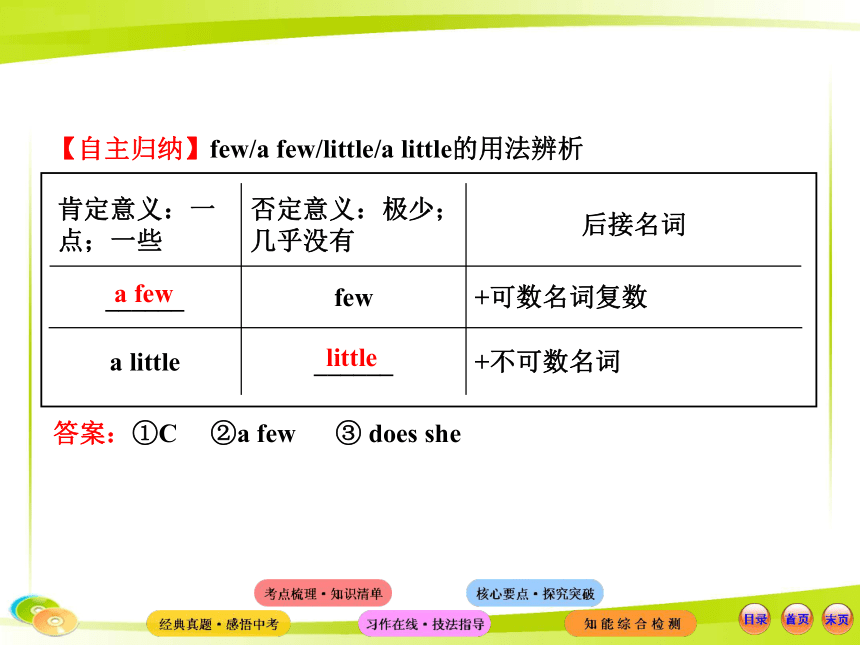
文档简介
课件44张PPT。七年级下册 Modules 1~41. enjoy (v. ) → __________ (adj. )令人愉快的
2. wait(v. ) → ______________ (n. )男/女服务员
3. sleep(n. &v. ) → ______ (adj. )困倦的
→ ______ (adj. )睡着的
4. greet(v. ) → ________ (n. )问候;致意
5. tradition(n. ) → __________ (adj. )传统的enjoyablewaiter/waitresssleepyasleepgreetingtraditional6. luck(n. ) → ______ (adj. )好运的
→ ________ (反义词)不幸的
→ _______ (adv. )幸运地
7. mean(v. ) → ________ (n. )意义;意思
→ ___________ (adj. )有意义的
→ ____________ (adj. )无意义的
8. few(pron. ) → ______ (比较级)较少的
→ _______ (最高级)最少的
9. colour(n. ) → _________ (adj. )绚丽多彩的luckyunluckyluckilymeaningmeaningfulmeaninglessfewerfewestcolourful10. culture(n. ) → ________ (adj. )文化的
11. foreign(adj. ) → _________ (n. )外国人
12. rain(n. &v. ) → ______ (adj. )阴雨的,多雨的
13. wind(n. ) → ______ (adj. )多风的
14. fly(v. ) → ______ (n. )(坐飞机)飞行
→ ______ (n. )航班
15. cheap(adj. ) → _________ (反义词)昂贵的
16. free(adj. ) → ________ (n. )自由
→ _____ (反义词)忙碌的culturalforeignerrainywindyflyingflightexpensivefreedombusy【品词自测】根据句意及汉语提示完成单词
①—What numbers are thought of ________ (幸运的)ones in China?
—6, 8, 9.
②Several ________ (外国人)came to visit our school last week.
③The boy is so ________ (困倦的)that he falls ________ (睡着的)in class.
答案:①lucky ②foreigners ③sleepy; asleep1. 拍照 _____ photos
2. 等待;等候 wait ____
3. 长城 the ______ _____
4. 玩得高兴;过得愉快 have a _____ _____
5. 穿上;戴上 put ___
6. 现在;此时 ___ the ________takeforGreat Wallgood timeonatmoment7. 看…… look __
8. 为……准备好 get _____ ____
9. sweep away ______
10. a few ______
11. no one _____________
12. all the year round __________
13. look forward to ______
14. go sightseeing _______atready for扫去一些没有人;无人一年到头期待去观光1. 我们正玩得很高兴!
We ____ _______ a good time!
2. 感谢你从长城发给我的明信片。
_______ ____ ___ your postcard from the Great Wall.
3. 有舞龙和舞狮。
______ __ dragon and lion dancing. are havingThank you forThere is4. 我要去上钢琴课。
I ____ ______ __ _____ a piano lesson.
5. 你愿意来吗?
______ ____ ____ to come?
6. 将来每张课桌上都会有一台电脑。
______ ____ ___ a computer on every desk in the future. am going to haveWould you likeThere will be1. 现在进行时 【见P156】
2. 一般将来时 【见P157】1. few pron. 不多,很少
◆We don’t clean the house for a few days.
我们好几天没打扫房子了。
①Hurry up! We have _______ time left.
A. few B. a few C. little D. a little
②He saw ______ ______ (好几个)students waiting for the bus.
③ She has few friends here, ______ ______ ? (完成反意疑问句)【自主归纳】few/a few/little/a little的用法辨析答案:①C ②a few ③ does shea fewlittle【判断抢答】判断下面句子翻译正误
冰箱里几乎没肉了,是吗?
①There is little meat in the fridge, isn’t there? ( )
②There is little meat in the fridge, is there? ( )×√2. bring v. 带来
◆They are round and so they bring us good luck all the year round.
它们是圆的, 因此它们给我们带来一年的好运。
①Don’t forget to _______ your homework tomorrow.
②The box is too heavy to _______.
③请把这个空箱子拿走吧。
Please _______ the empty box away. 【自主归纳】答案:① bring ②carry ③take_____(. . . to. . . )拿去;带去把某物(人)从说话处带到别处,与bring方向相反______ (. . . to. . . )
拿来;带来把某物(人)从别处带到说话处______搬运;提;拿不强调方向,但有负重之意____拿来;取来
(=fetch)去别处把某物(人)带来,强调动作的往返takebringcarryget3. put on穿上;戴上
◆Put on your clothes.
穿上你的衣服。
①It took her a long time to _______ a new dress for the party at the store.
A. put on B. put away C. put up②—I saw Ann _______ a green dress at the school meeting.
—I think she looks better _______ red.
A. dressed; in B. put on; wear
C. wearing; in D. wear; put on
③My daughter is too young to ______ ______ (给自己穿衣服). 【自主归纳】dress
给……
穿衣表示动作或状态, 宾语通常是人:dress sb. “给某人穿衣服”(动作); be/get dressed in. . . “穿着……”(状态)put on
穿上;戴上强调动作,宾语通常是衣
服、鞋帽;宾语若是代词必
须放在put和on之间;反义
词组是________put on/dress
表示动作take off答案:①A ②C ③dress herselfwear穿着;戴着强调状态,宾语可为服装、鞋帽、饰物、奖章等be in
穿着后接衣服、帽子等,此时可以和wear或have sth. on替换。其后也可以接颜色,不能用于进行时态wear/be in/
be dressed in
表示状态4. no one没有人;无人
◆No one will use paper, pencils and pens.
没有人使用纸、铅笔和钢笔。
①—How many students are there in the room?
— _______. (用no one/ none填空)②—Can you come on Monday or Tuesday?
—I’m afraid _______ day is possible.
A. either B. neither C. some D. any
③—Who will go to the movie with me?
— _______. We are all preparing for our test.
A. Both B. Neither C. None D. No one【自主归纳】 no one/ neither/ none的用法辨析no one不能单数neither单数答案:①None ②B ③D单数Ⅰ. 根据句意及首字母或汉语提示完成单词
1. (2012·杭州中考)—What do you want to be in the f _______?
—I want to become a teacher.
2. (2011·安徽中考)My grandma often gets up e _______ (早) to do exercise.
答案:1. future 2. early 3. (2011·镇江中考)I dislike this channel because _______ (少数) programmes on it are interesting.
4. (2011·莱芜中考)What’s your _______ (计划)for the summer vacation?
5. (2011·南充中考)Most children like _______ (甜的)food.
6. (2011·枣庄中考) _______ (等)for her made me angry.
答案:3. few 4. plan 5. sweet 6. WaitingⅡ. 用所给词的适当形式填空
1. (2012·永州中考)Li Ming enjoys _______ the guitar very much. (play)
2. (2012·淮安中考)Peter and Simon enjoyed _______ (they) at the English party last night.
答案:1. playing 2. themselves3. (2012·滨州中考)There _______ (be) a meeting in our school tomorrow afternoon.
4. (2011·滨州中考)—Keep quiet, kids, Dad _______ (sleep) in the next room.
— OK, Mum.
5. (2011·泰州中考)In the modern world, people often contact each other by _______ (send) e-mails.
答案:3. will be 4. is sleeping 5. sending 6. (2011·安顺中考)The dinner room must _______ (clean) three times a day.
7. (2011·广元中考)—Excuse me. Where’s Mr. Wang?
—He _______ (play) football on the playground with his students.
8. (2011·无锡中考)Every one of us was excited, for in a few minutes we _______ (see) Liu Xiang appear on the sports ground.
答案:6. be cleaned 7. is playing 8. would seeⅢ. 单项选择
1. (2012·菏泽中考)Some of the students are nearsighted _______ they spend too much time watching TV or playing online games.
A. when B. though C. because D. unless
【解析】选C。考查连词。句意:一些学生眼睛近视了,因为他们花费太多的时间看电视或者玩在线游戏。两句存在因果关系,故用because。when当……时候;though尽管……;unless除非。三者均不符合题意。2. (2012·连云港中考)—Have you bought _______ for Linda’s birthday?
—Not exactly. Just some flowers.
A. something unusual B. anything unusual
C. unusual something D. unusual anything
【解析】选B。考查形容词及不定代词的用法。形容词修饰不定代词时要后置,故排除C、D两项,又因为第一句为疑问句,故选B。3. (2011·广元中考)—Can you speak English, Mr. Wang?
—Yes, but only _______.
A. little B. a little C. a lot
【解析】选B。考查词义辨析。little, a little用来修饰不可数名词,little 表示否定概念,a little 表示肯定概念;a lot用来修饰动词。由句意“——王先生,你会说英语吗?——是的,但是只会一点。”可知应填a little。4. (2011·株洲中考)Tony wants _______ a job as a language teacher in China.
A. to find B. finding C. find
【解析】选A。考查动词不定式。句意:托尼想在中国找一份当语言老师的工作。want to do sth. 想要做某事。动词不定式作want的宾语。5. (2011·广安中考)—David, can you _______ yourself?
—Of course, I can.
A. dress B. put on C. wear
【解析】选A。考查动词短语。句意:——大卫,你会自己穿衣服吗?——我当然会。dress oneself 为自己穿衣服;put on和wear的宾语应该为衣服。 有关“未来生活计划”的话题是历年许多地市中考考查频率最高的话题之一,其中以学生们为背景设题最为常见。在写作此类话题作文的过程中要特别注意几点:
1. 有关“未来生活计划”的话题应该使用一般将来时;
2. 所给要点要全面。【典题示例】
(2011·大庆中考)
亲爱的同学,随着你走出本次中考的考场,初中的学习生活就结束了,迎接你的是近两个月的轻松假期。有的同学计划去旅游; 有的安排走亲访友; 有的想要上网( surf the Internet)、看电视、听音乐;有的在娱乐休息之余打算读些书、学点儿生活技能、参加一些实践活动;还有的……
你想好了吗?
请用英文写出你的假期计划。词数80左右;短文开头已给出,不计入总词数。 包括以下要点:
1. What are you going to do?
2. How are you going to plan your activities? Why?
3. What do you expect your coming holiday will be like?
The summer vacation is coming. . .
__________________________________________________________________________________________________________________________________________________________________【审题谋篇】
1. 本篇谈论假期计划,应为记叙文,主要考查学生在英语语言运用方面对未来的规划和安排能力。
2. 人称:第一人称
3. 主要时态:计划将来——一般将来时(be going to/will do/be doing) 4. 高分模板:【佳作诵读】
The summer vacation is coming. What are you going to do this vacation?I’m going to go to Beijing this summer. I will visit some places of great interest. For example, I want to visit the Great Wall with my parents. Because I want to be “a true man”. And I also want to visit the Tian’anmen Square. I am looking forward to meeting the foreigners. Because I want topractice speaking English with them. Then I want to take part in the Children’ s Palace. I want to learn to play the guitar. I want to be a good singer in the future. I think being a singer is very cool. My favourite singer is Micheal Jackson.
I hope I can have a happy vacation. What about you? What are you going to do this summer? 【名师点睛】
(1)文章以一个问句What are you going to do this vacation?开头,开门见山地提出了这个假期的计划。
(2)文章正确运用了“be doing”、“be going to”结构和“will + 动词原形”三种一般将来时的表达方式,使文章富于变化,同时也体现了较强的语言驾驭能力。
(3)还成功运用了for example, look forward to, practice doing sth. 以及一般将来时的特殊疑问句,增添了文章的亮点。
2. wait(v. ) → ______________ (n. )男/女服务员
3. sleep(n. &v. ) → ______ (adj. )困倦的
→ ______ (adj. )睡着的
4. greet(v. ) → ________ (n. )问候;致意
5. tradition(n. ) → __________ (adj. )传统的enjoyablewaiter/waitresssleepyasleepgreetingtraditional6. luck(n. ) → ______ (adj. )好运的
→ ________ (反义词)不幸的
→ _______ (adv. )幸运地
7. mean(v. ) → ________ (n. )意义;意思
→ ___________ (adj. )有意义的
→ ____________ (adj. )无意义的
8. few(pron. ) → ______ (比较级)较少的
→ _______ (最高级)最少的
9. colour(n. ) → _________ (adj. )绚丽多彩的luckyunluckyluckilymeaningmeaningfulmeaninglessfewerfewestcolourful10. culture(n. ) → ________ (adj. )文化的
11. foreign(adj. ) → _________ (n. )外国人
12. rain(n. &v. ) → ______ (adj. )阴雨的,多雨的
13. wind(n. ) → ______ (adj. )多风的
14. fly(v. ) → ______ (n. )(坐飞机)飞行
→ ______ (n. )航班
15. cheap(adj. ) → _________ (反义词)昂贵的
16. free(adj. ) → ________ (n. )自由
→ _____ (反义词)忙碌的culturalforeignerrainywindyflyingflightexpensivefreedombusy【品词自测】根据句意及汉语提示完成单词
①—What numbers are thought of ________ (幸运的)ones in China?
—6, 8, 9.
②Several ________ (外国人)came to visit our school last week.
③The boy is so ________ (困倦的)that he falls ________ (睡着的)in class.
答案:①lucky ②foreigners ③sleepy; asleep1. 拍照 _____ photos
2. 等待;等候 wait ____
3. 长城 the ______ _____
4. 玩得高兴;过得愉快 have a _____ _____
5. 穿上;戴上 put ___
6. 现在;此时 ___ the ________takeforGreat Wallgood timeonatmoment7. 看…… look __
8. 为……准备好 get _____ ____
9. sweep away ______
10. a few ______
11. no one _____________
12. all the year round __________
13. look forward to ______
14. go sightseeing _______atready for扫去一些没有人;无人一年到头期待去观光1. 我们正玩得很高兴!
We ____ _______ a good time!
2. 感谢你从长城发给我的明信片。
_______ ____ ___ your postcard from the Great Wall.
3. 有舞龙和舞狮。
______ __ dragon and lion dancing. are havingThank you forThere is4. 我要去上钢琴课。
I ____ ______ __ _____ a piano lesson.
5. 你愿意来吗?
______ ____ ____ to come?
6. 将来每张课桌上都会有一台电脑。
______ ____ ___ a computer on every desk in the future. am going to haveWould you likeThere will be1. 现在进行时 【见P156】
2. 一般将来时 【见P157】1. few pron. 不多,很少
◆We don’t clean the house for a few days.
我们好几天没打扫房子了。
①Hurry up! We have _______ time left.
A. few B. a few C. little D. a little
②He saw ______ ______ (好几个)students waiting for the bus.
③ She has few friends here, ______ ______ ? (完成反意疑问句)【自主归纳】few/a few/little/a little的用法辨析答案:①C ②a few ③ does shea fewlittle【判断抢答】判断下面句子翻译正误
冰箱里几乎没肉了,是吗?
①There is little meat in the fridge, isn’t there? ( )
②There is little meat in the fridge, is there? ( )×√2. bring v. 带来
◆They are round and so they bring us good luck all the year round.
它们是圆的, 因此它们给我们带来一年的好运。
①Don’t forget to _______ your homework tomorrow.
②The box is too heavy to _______.
③请把这个空箱子拿走吧。
Please _______ the empty box away. 【自主归纳】答案:① bring ②carry ③take_____(. . . to. . . )拿去;带去把某物(人)从说话处带到别处,与bring方向相反______ (. . . to. . . )
拿来;带来把某物(人)从别处带到说话处______搬运;提;拿不强调方向,但有负重之意____拿来;取来
(=fetch)去别处把某物(人)带来,强调动作的往返takebringcarryget3. put on穿上;戴上
◆Put on your clothes.
穿上你的衣服。
①It took her a long time to _______ a new dress for the party at the store.
A. put on B. put away C. put up②—I saw Ann _______ a green dress at the school meeting.
—I think she looks better _______ red.
A. dressed; in B. put on; wear
C. wearing; in D. wear; put on
③My daughter is too young to ______ ______ (给自己穿衣服). 【自主归纳】dress
给……
穿衣表示动作或状态, 宾语通常是人:dress sb. “给某人穿衣服”(动作); be/get dressed in. . . “穿着……”(状态)put on
穿上;戴上强调动作,宾语通常是衣
服、鞋帽;宾语若是代词必
须放在put和on之间;反义
词组是________put on/dress
表示动作take off答案:①A ②C ③dress herselfwear穿着;戴着强调状态,宾语可为服装、鞋帽、饰物、奖章等be in
穿着后接衣服、帽子等,此时可以和wear或have sth. on替换。其后也可以接颜色,不能用于进行时态wear/be in/
be dressed in
表示状态4. no one没有人;无人
◆No one will use paper, pencils and pens.
没有人使用纸、铅笔和钢笔。
①—How many students are there in the room?
— _______. (用no one/ none填空)②—Can you come on Monday or Tuesday?
—I’m afraid _______ day is possible.
A. either B. neither C. some D. any
③—Who will go to the movie with me?
— _______. We are all preparing for our test.
A. Both B. Neither C. None D. No one【自主归纳】 no one/ neither/ none的用法辨析no one不能单数neither单数答案:①None ②B ③D单数Ⅰ. 根据句意及首字母或汉语提示完成单词
1. (2012·杭州中考)—What do you want to be in the f _______?
—I want to become a teacher.
2. (2011·安徽中考)My grandma often gets up e _______ (早) to do exercise.
答案:1. future 2. early 3. (2011·镇江中考)I dislike this channel because _______ (少数) programmes on it are interesting.
4. (2011·莱芜中考)What’s your _______ (计划)for the summer vacation?
5. (2011·南充中考)Most children like _______ (甜的)food.
6. (2011·枣庄中考) _______ (等)for her made me angry.
答案:3. few 4. plan 5. sweet 6. WaitingⅡ. 用所给词的适当形式填空
1. (2012·永州中考)Li Ming enjoys _______ the guitar very much. (play)
2. (2012·淮安中考)Peter and Simon enjoyed _______ (they) at the English party last night.
答案:1. playing 2. themselves3. (2012·滨州中考)There _______ (be) a meeting in our school tomorrow afternoon.
4. (2011·滨州中考)—Keep quiet, kids, Dad _______ (sleep) in the next room.
— OK, Mum.
5. (2011·泰州中考)In the modern world, people often contact each other by _______ (send) e-mails.
答案:3. will be 4. is sleeping 5. sending 6. (2011·安顺中考)The dinner room must _______ (clean) three times a day.
7. (2011·广元中考)—Excuse me. Where’s Mr. Wang?
—He _______ (play) football on the playground with his students.
8. (2011·无锡中考)Every one of us was excited, for in a few minutes we _______ (see) Liu Xiang appear on the sports ground.
答案:6. be cleaned 7. is playing 8. would seeⅢ. 单项选择
1. (2012·菏泽中考)Some of the students are nearsighted _______ they spend too much time watching TV or playing online games.
A. when B. though C. because D. unless
【解析】选C。考查连词。句意:一些学生眼睛近视了,因为他们花费太多的时间看电视或者玩在线游戏。两句存在因果关系,故用because。when当……时候;though尽管……;unless除非。三者均不符合题意。2. (2012·连云港中考)—Have you bought _______ for Linda’s birthday?
—Not exactly. Just some flowers.
A. something unusual B. anything unusual
C. unusual something D. unusual anything
【解析】选B。考查形容词及不定代词的用法。形容词修饰不定代词时要后置,故排除C、D两项,又因为第一句为疑问句,故选B。3. (2011·广元中考)—Can you speak English, Mr. Wang?
—Yes, but only _______.
A. little B. a little C. a lot
【解析】选B。考查词义辨析。little, a little用来修饰不可数名词,little 表示否定概念,a little 表示肯定概念;a lot用来修饰动词。由句意“——王先生,你会说英语吗?——是的,但是只会一点。”可知应填a little。4. (2011·株洲中考)Tony wants _______ a job as a language teacher in China.
A. to find B. finding C. find
【解析】选A。考查动词不定式。句意:托尼想在中国找一份当语言老师的工作。want to do sth. 想要做某事。动词不定式作want的宾语。5. (2011·广安中考)—David, can you _______ yourself?
—Of course, I can.
A. dress B. put on C. wear
【解析】选A。考查动词短语。句意:——大卫,你会自己穿衣服吗?——我当然会。dress oneself 为自己穿衣服;put on和wear的宾语应该为衣服。 有关“未来生活计划”的话题是历年许多地市中考考查频率最高的话题之一,其中以学生们为背景设题最为常见。在写作此类话题作文的过程中要特别注意几点:
1. 有关“未来生活计划”的话题应该使用一般将来时;
2. 所给要点要全面。【典题示例】
(2011·大庆中考)
亲爱的同学,随着你走出本次中考的考场,初中的学习生活就结束了,迎接你的是近两个月的轻松假期。有的同学计划去旅游; 有的安排走亲访友; 有的想要上网( surf the Internet)、看电视、听音乐;有的在娱乐休息之余打算读些书、学点儿生活技能、参加一些实践活动;还有的……
你想好了吗?
请用英文写出你的假期计划。词数80左右;短文开头已给出,不计入总词数。 包括以下要点:
1. What are you going to do?
2. How are you going to plan your activities? Why?
3. What do you expect your coming holiday will be like?
The summer vacation is coming. . .
__________________________________________________________________________________________________________________________________________________________________【审题谋篇】
1. 本篇谈论假期计划,应为记叙文,主要考查学生在英语语言运用方面对未来的规划和安排能力。
2. 人称:第一人称
3. 主要时态:计划将来——一般将来时(be going to/will do/be doing) 4. 高分模板:【佳作诵读】
The summer vacation is coming. What are you going to do this vacation?I’m going to go to Beijing this summer. I will visit some places of great interest. For example, I want to visit the Great Wall with my parents. Because I want to be “a true man”. And I also want to visit the Tian’anmen Square. I am looking forward to meeting the foreigners. Because I want topractice speaking English with them. Then I want to take part in the Children’ s Palace. I want to learn to play the guitar. I want to be a good singer in the future. I think being a singer is very cool. My favourite singer is Micheal Jackson.
I hope I can have a happy vacation. What about you? What are you going to do this summer? 【名师点睛】
(1)文章以一个问句What are you going to do this vacation?开头,开门见山地提出了这个假期的计划。
(2)文章正确运用了“be doing”、“be going to”结构和“will + 动词原形”三种一般将来时的表达方式,使文章富于变化,同时也体现了较强的语言驾驭能力。
(3)还成功运用了for example, look forward to, practice doing sth. 以及一般将来时的特殊疑问句,增添了文章的亮点。
